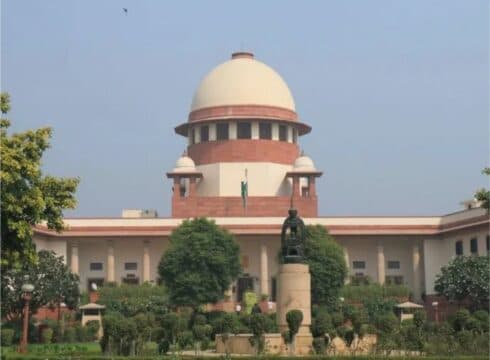The Apex Court noted that “two blue ticks” on WhatsApp would convey that the reader has seen the notice
The top court said that in case the blue ticks don’t show, the summons or notice could be delivered by email
During the lockdown, SC judges were conducting hearings through video conferencing
Inc42 Daily Brief
Stay Ahead With Daily News & Analysis on India’s Tech & Startup Economy
The Supreme Court of India, on Friday, allowed legal summons and notices to be served via messaging applications such as WhatsApp and Telegram, or through email and fax, because of the coronavirus pandemic.
The order came during a hearing on extending the limitation period of filing appeals in high courts and tribunals due to the pandemic.
Attorney general KK Venugopal and solicitor general Tushar Mehta also suggested that the delivery of summons or notices through email should be constituted as valid delivery of these legal instruments. The bench accepted these suggestions.
The bench, comprising justices AS Bopanna and R Subhash Reddy noted that “two blue ticks” on WhatsApp would convey that the reader has seen the notice. It was noted that it is easy for users to change their WhatsApp settings so that the sender doesn’t see the blue ticks. In that case, the court said that the summons could be delivered through fax or email and it would constitute valid delivery, received and seen by the intended recipient.
“It has been brought to our notice that it was not possible to visit post offices for services of notices, summons, pleadings. Such service of all the above may be done through email, fax and other instant messenger services like WhatsApp and other telephone messenger services,” the top court said.
Chief Justice SA Bobde stressed on the need to adapt to new technology and accept the fact that eventually, things must settle down “to a system of new and old.”
He added that in the future, artificial intelligence (AI) could be useful in deciding cases. “In future, AI will be useful in deciding cases. If AI had been used, the Ayodhya case would have been decided without delay.”
In May, SC rolled out an e-filing facility for lawyers to file petitions before court hours.
Amid the country-wide lockdown due to the Covid-19 pandemic, SC judges were conducting hearings through video conference, on the Canada-based platform ‘Vidyo’, but have lately returned to the courtrooms. While the respondents in the court are still required to attend only through video conference, the lawyers argue from their respective chambers.
{{#name}}{{name}}{{/name}}{{^name}}-{{/name}}
{{#description}}{{description}}...{{/description}}{{^description}}-{{/description}}
Note: We at Inc42 take our ethics very seriously. More information about it can be found here.


